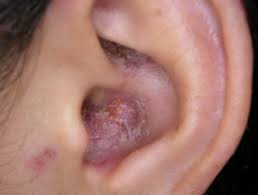General Health Tips & News
Otitis Externa (Swimmer’s Ear)
By I.K. (staff writer) , published on October 26, 2020

Medicine Telehealth Health Otitis Externa Swimmer's Ear
Otitis externa is a problem that causes inflammation (redness and swelling) of the external ear canal, which is the tube in between outer ear and the eardrum.
Otitis externa usually referred to as “swimmer’s ear” because repeated exposure to water may make the ear canal more vulnerable to inflammation.
Symptoms of otitis externa include:
- ear aching, which can be severe and exaggerated with the movement of pinna
- itchiness in the ear canal
- release of fluid or pus from the ear (Otorrhea)
- Swelling, redness and tenderness in the auricle
- some degree of temporary hearing loss
Usually, only one ear is affected.
Causes of otitis externa
Although otitis externa has various etiologies, the common causes of this painful condition include:
- Bacterial Infections
- Fungal infections
- Allergies
- Scratching inside ear due to irritation
Moreover, there are certain factors that makes one more susceptible to the etiologies of otitis externa. Such factors include:
- Moisture inside the ear
- Obstruction of ear canal due to ear wax or tumor
Getting water in your ear is especially significant because it can cause you to scratch inside your ear, and moisture also offers an excellent environment for bacteria to grow
Who is affected?
Otitis externa is relatively common. It is assessed that around 1 in 10 people will be affected at some point in their lives. The condition is slightly more common in women than in men and is most commonly diagnosed in adults aged 45 to 75 years. People with certain long-term (chronic) conditions are at higher risk of getting affected by the disease. These include the following:
- Eczema
- Asthma
- Allergic rhinitis
Treatment of Otitis Externa
Otitis externa frequently gets better without medication, but it can take a few weeks. Your GP may recommend ear drop medication, including broad-spectrum antibiotics, that will usually improve your symptoms within a few days. There are many kinds of ear drops that may help to treat otitis externa, but they are to be used several times a day for about a week.
Your GP may mention you to a specialist for extra care and advice if symptoms are severe or fail to respond to treatment.
Preventing otitis externa
You should avoid using cotton wool buds and putting other things in your ears (including your fingers) to help minimize your chances of developing otitis externa, as this can damage the sensitive skin in your ear canal.
If you’re a regular swimmer, use earplugs when swimming or wearing a swim cap to protect your ears from water.
It would help if you also tried avoiding getting water, soap or shampoo in your ears when you have a shower or a bath.
Otitis externa, if gets chronic, can cause many complications like hyperkeratosis, hyperpigmentation and lichenification. Therefore, as soon as you develop symptoms, consult your ENT specialist immediately.
References
https://www.ncbi.nlm.nih.gov/books/NBK556055/
https://www.ncbi.nlm.nih.gov/pmc/articles/PMC6522672/
https://journals.lww.com/jaapa/Citation/2018/02000/Otitis_externa.10.aspx
Find articles related to: Medicine Telehealth Health Otitis Externa Swimmer's Ear
More articles about General Health Tips & News
Back to the Health Tips Index




